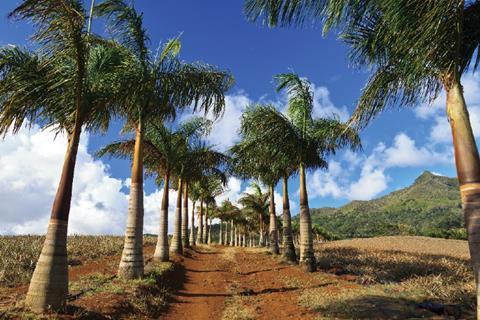
Mauritius might be best known as a dream location for loved-up honeymooners, but the Indian Ocean nation’s farmers are now hoping it can also be recognised as a source of quality fruit and vegetables.
Historically a producer of sugar cane, the country’s growers have been diversifying in a major way into fruit and vegetable production, with the island well blessed climatically to produce a wide variety of fresh produce in both summer and winter. Now exporting to around 14 countries, a diverse selection of tropical fruits such as lychees and mangoes are available mostly in the summer, while some such as Victoria pineapples, papayas, bananas and passionfruit are year-round.
National trade promotional body Enterprise Mauritius (EM) has been promoting exotic fruit exports on the international markets, and has been exhibiting at Fruit Logistica since 2012. “This show has enabled us to build a solid reputation for Mauritius as a reliable supplier of quality fresh produce and also showcase the emergence of new fresh produce exporters,” says EM division manager Geerish Bucktowonsing.
Exports rose six per cent in 2016 compared to 2015, and 2016 fresh produce exports were worth some $5 million, with pineapples and lychees being the main products traded. In order to diversify its export basket, Mauritian exporters will be introducing other exotic fruits and vegetables such as passionfruit, breadfruit, jackfruit, avocado, green mangoes, chillies and chayote at this year’s Fruit Logistica.
Twelve Mauritian companies will be appearing in Berlin, including five for the first time, of which two are pineapple co-operative grower societies. The latter are part of the GlobalGAP certification project managed by EM.
Mauritian exporters are also taking advantage of the Speed-to-Market Scheme for Exports to Europe, introduced by the government of Mauritius, which entails a 40 per cent refund of airfreight to qualifying Mauritian fresh produce exporters. This scheme aims to boost exports to European countries and increase trade. The 40 per cent rebate is equally shared among growers and exporters. Arvind Radhakrishna, chief executive of Enterprise Mauritius, explains: “This scheme enables Mauritian exporters to make a competitive pricing offer with their existing buyers and get new buyers particularly to enter new markets in eastern Europe. It also encourages growers to produce quality products for export”.
Chief executive Arvind Radhakrishna and division manager Geerish Bucktowonsing discuss the current state of play and future opportunities for the Mauritian fresh produce sector
Tell us about the Mauritian fruit and vegetable sector. What are the main products you grow there, and where are your major export destinations?
Historically, Mauritius was a mono-crop country producing mainly sugar cane for exports to the European markets under the Cotonou Agreement. However, fruits and vegetables were also cultivated for local consumption. With the dismantling of the sugar protocol, which included a reduction in sugar price and abolition of quotas, many small sugar cane growers abandoned their sugar cane plantations. The government of Mauritius has come forward with the Strategic Plan 2016-2020 for the food crop, livestock and forestry sectors. This plan targets a robust fruit and vegetable sector in Mauritius. The government is also aiming to enhance food security as well as achieving self-sufficiency in potato, onion, garlic and ginger production. Besides growing vegetables for local consumption and tourist markets, exports are also an interesting venture due to demand for tropical fruits from overseas markets. Products grown for export include Victoria pineapple, lychees, chillies and breadfruit. Major export destinations include France, the Netherlands, Switzerland and the UAE.
To what extent are farmers investing in their businesses, and how important is sustainability to producers?
Presently, the Mauritian agricultural sector is transiting into a new diversified non-sugar sector, comprising production of a large variety of fruits and vegetables. Much emphasis is being made for the production of high-quality strategic crops with export potential in the region and international markets. Bio food and bio farming are also being encouraged. As Mauritius is very vulnerable to climatic conditions, the government is extending support for sheltered and hydroponic farming. Less use of pesticides is being recommended and controlled. Farmers are being supported to diversify their crop production, make less use of pesticides and opt for bio farming. Government grants are also being provided for farmers to add value on their fresh products. Young farmers are becoming very keen to adopt good agricultural practice. The Ministry of Agro Industry and Food Security has also developed the MauriGAP standards – local quality norms developed with reference to GlobalGAP Standards. Growers are looking to adopt MauriGAP standards.
What makes Mauritian produce stand out?
We stand out on the quality of our produce for export markers and its taste. Victoria pineapples are an asset for Mauritius. The size, colour and taste make it a unique product from Mauritius. Mauritius is a pioneer in supplying this Victoria pineapple on the international markets, and our major exporters are GlobalGap certified.
What are the main issues facing producers at the moment?
The growing airfreight cost is becoming a major hurdle and the changing climatic conditions are a matter of concern. Mauritian producers are also concerned with a new Victoria pineapple which is now being grown overseas.
What’s the export strategy moving forward?
Mauritius lays emphasis on supplying quality products to targeted markets in the EU. Our farmers, with the support of the EU Commission (Mauritius) and Enterprise Mauritius, are graduating from simple production systems to international standard practices and applying GlobalGAP standards. Our strategy is to develop niche markets and maintain our good name as a reliable supplier of unique fresh products like Victoria pineapples, lychees, breadfruit, cut flowers and foliage.
Do you supply the UK, and what plans do you have to increase this?
The UK is an interesting market to explore. Presently, exports to the UK comprise mainly breadfruits, vegetables and lychees. Our plan is to increase the export volume of Victoria pineapples and other exotic fruits which are presently low compared to other markets.



